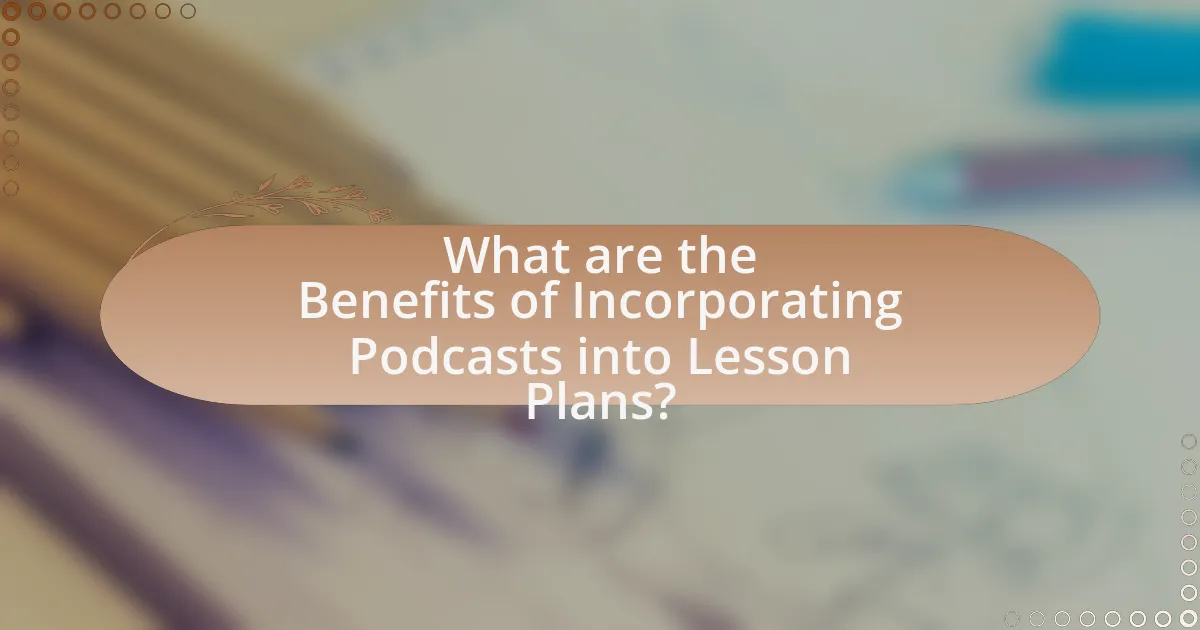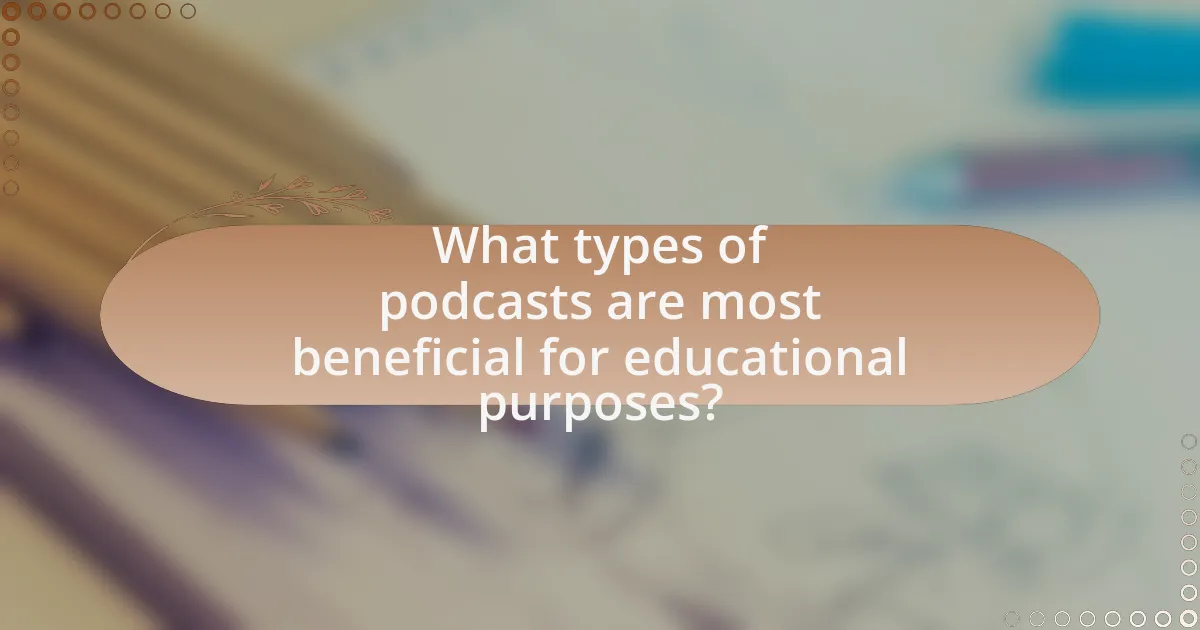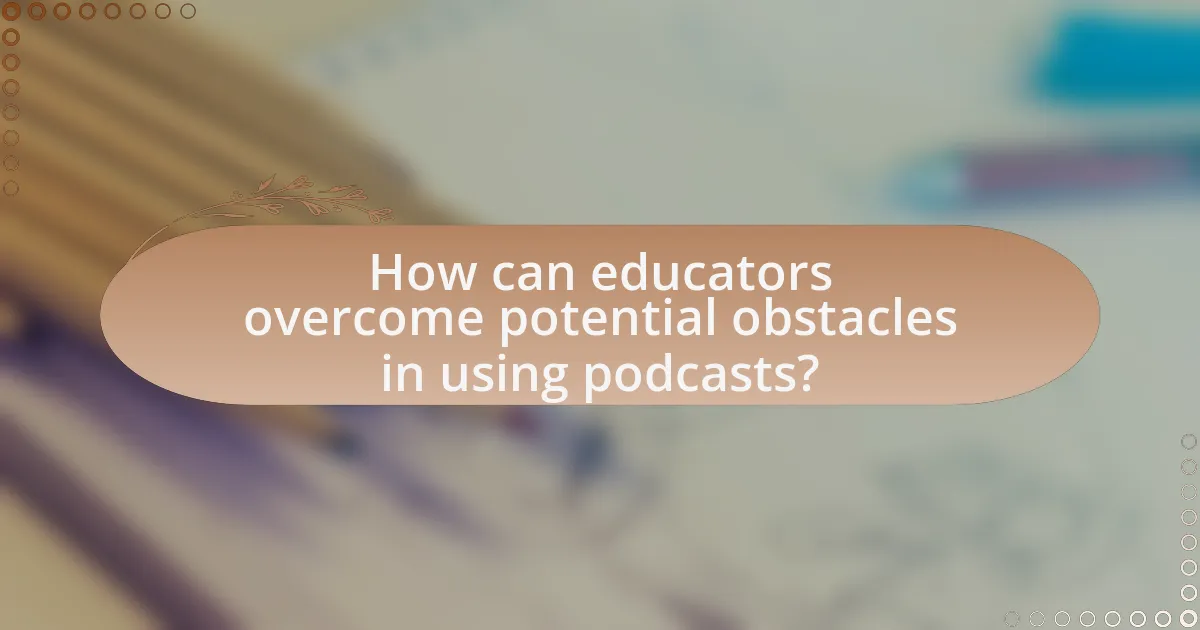The article focuses on the benefits of incorporating podcasts into lesson plans, highlighting their ability to enhance student engagement and improve learning outcomes. It discusses how podcasts provide diverse perspectives, cater to various learning styles, and facilitate differentiated instruction, ultimately fostering a more inclusive educational environment. Key findings from research indicate that podcasts can significantly increase retention rates and motivation among students, making them a valuable resource for educators. The article also addresses practical strategies for integrating podcasts into curricula, evaluating their effectiveness, and overcoming potential challenges in their implementation.

What are the Benefits of Incorporating Podcasts into Lesson Plans?
Incorporating podcasts into lesson plans enhances student engagement and improves learning outcomes. Podcasts provide diverse perspectives and real-world applications of concepts, making lessons more relatable and stimulating. Research indicates that auditory learning can increase retention rates; for instance, a study by the University of Massachusetts found that students who engaged with audio content scored 20% higher on retention tests compared to those who relied solely on traditional reading materials. Additionally, podcasts can cater to various learning styles, allowing auditory learners to thrive while also providing visual aids through supplementary materials. This multifaceted approach fosters a more inclusive learning environment, ultimately benefiting students’ educational experiences.
How can podcasts enhance student engagement in the classroom?
Podcasts can enhance student engagement in the classroom by providing diverse, accessible content that caters to various learning styles. This auditory medium allows students to absorb information in a more engaging way, fostering active listening and critical thinking. Research indicates that incorporating podcasts into lesson plans can lead to increased motivation and participation; for instance, a study by the University of Massachusetts found that students who listened to educational podcasts reported higher levels of interest and retention compared to traditional lecture formats. By integrating podcasts, educators can create a dynamic learning environment that encourages collaboration and discussion, ultimately enhancing the overall educational experience.
What features of podcasts capture students’ attention?
Podcasts capture students’ attention through engaging storytelling, relatable content, and diverse formats. Engaging storytelling keeps listeners invested, as narratives can evoke emotions and stimulate curiosity. Relatable content connects with students’ interests and experiences, making the material more relevant and easier to understand. Additionally, diverse formats, such as interviews, discussions, and sound effects, cater to different learning styles and maintain interest. Research indicates that 78% of students find podcasts more engaging than traditional lectures, highlighting their effectiveness in capturing attention.
How do podcasts cater to different learning styles?
Podcasts cater to different learning styles by providing auditory content that appeals to auditory learners, while also incorporating storytelling and discussions that engage visual and kinesthetic learners. Auditory learners benefit from the spoken word, allowing them to absorb information through listening, which is supported by research indicating that auditory processing is a key component of effective learning (Mayer, 2001). Visual learners can enhance their understanding through accompanying visuals or supplementary materials that may be referenced in the podcast, while kinesthetic learners can engage with the content by taking notes or participating in related activities prompted by the podcast discussions. This multi-modal approach aligns with Howard Gardner’s theory of multiple intelligences, which emphasizes the importance of addressing diverse learning preferences to optimize educational outcomes.
Why are podcasts a valuable resource for educators?
Podcasts are a valuable resource for educators because they provide accessible, diverse content that enhances learning experiences. Educators can utilize podcasts to present complex topics in an engaging format, catering to various learning styles. Research indicates that 70% of podcast listeners feel more connected to the content, which can lead to improved retention of information. Additionally, podcasts can be integrated into lesson plans to promote critical thinking and discussion, as they often feature expert interviews and real-world applications. This integration supports the development of listening skills and encourages students to engage with material outside traditional textbooks.
What unique content do podcasts provide that textbooks may lack?
Podcasts provide dynamic, conversational content that textbooks may lack, offering real-time discussions and diverse perspectives on topics. This format allows for the inclusion of interviews with experts, personal anecdotes, and current events, which can enhance engagement and relatability. For instance, a study by the Pew Research Center found that 64% of podcast listeners feel more connected to the subject matter due to the personal storytelling and informal tone often used in podcasts, making complex ideas more accessible and memorable compared to traditional textbook formats.
How can podcasts facilitate differentiated instruction?
Podcasts can facilitate differentiated instruction by providing diverse content that caters to various learning styles and paces. They allow educators to present information in auditory formats, which benefits auditory learners, while also offering flexibility for students to engage with material at their own speed. Research indicates that students who engage with audio content demonstrate improved comprehension and retention, as highlighted in a study by the University of Minnesota, which found that 70% of students preferred learning through podcasts over traditional methods. This adaptability makes podcasts an effective tool for meeting the individual needs of learners in a classroom setting.
What impact do podcasts have on student learning outcomes?
Podcasts positively impact student learning outcomes by enhancing engagement, improving retention, and facilitating diverse learning styles. Research indicates that students who listen to educational podcasts demonstrate higher levels of understanding and recall compared to traditional learning methods. For instance, a study published in the Journal of Educational Technology & Society found that 70% of students reported improved comprehension when using podcasts as a supplementary resource. Additionally, podcasts cater to auditory learners and provide flexible access to content, allowing students to learn at their own pace, which further supports individualized learning experiences.
How do podcasts improve retention of information?
Podcasts improve retention of information by engaging multiple senses and providing a narrative structure that enhances memory recall. The auditory format allows listeners to absorb content while multitasking, which can lead to better retention compared to traditional reading. Research indicates that auditory learning can enhance memory by creating stronger neural connections; for instance, a study published in the Journal of Educational Psychology found that students who listened to audio content retained 20% more information than those who read the same material. Additionally, the storytelling aspect of podcasts helps contextualize information, making it more relatable and easier to remember.
What evidence supports the effectiveness of podcasts in education?
Podcasts are effective in education as they enhance student engagement and improve learning outcomes. Research conducted by the University of Massachusetts found that students who listened to educational podcasts demonstrated a 20% increase in retention of information compared to traditional lecture methods. Additionally, a study published in the Journal of Educational Technology & Society indicated that 85% of students reported increased motivation and interest in the subject matter when podcasts were integrated into their learning. These findings underscore the potential of podcasts to facilitate active learning and cater to diverse learning styles.
How can educators effectively integrate podcasts into their lesson plans?
Educators can effectively integrate podcasts into their lesson plans by aligning podcast content with curriculum objectives and utilizing them as supplementary materials for discussions or projects. For instance, teachers can select podcasts that cover relevant topics, ensuring they enhance students’ understanding of the subject matter. Research indicates that using podcasts can improve student engagement and retention; a study published in the Journal of Educational Technology & Society found that 70% of students reported increased motivation when learning through podcasts. Additionally, educators can assign podcast episodes as homework, followed by in-class discussions or reflections, fostering critical thinking and collaborative learning.
What challenges might educators face when using podcasts in lessons?
Educators may face several challenges when using podcasts in lessons, including technological barriers, varying student engagement levels, and content relevance. Technological barriers can arise from inadequate access to devices or unreliable internet connections, which can hinder students’ ability to listen to podcasts. Additionally, students may exhibit varying levels of engagement with audio content, as some learners may prefer visual or interactive materials, potentially leading to unequal learning experiences. Furthermore, ensuring that podcast content aligns with curriculum standards and is relevant to students’ interests can be difficult, as not all podcasts are designed with educational purposes in mind. These challenges can impact the effectiveness of podcasts as a teaching tool.

What types of podcasts are most beneficial for educational purposes?
Educational podcasts that are most beneficial include those focused on specific subjects, storytelling, interviews with experts, and current events analysis. Subject-focused podcasts, such as those in science, history, or mathematics, provide in-depth knowledge and insights that align with curriculum standards. Storytelling podcasts engage students by presenting information in a narrative format, making complex topics more relatable and memorable. Interviews with experts allow students to hear firsthand experiences and insights from professionals in various fields, enhancing their understanding of real-world applications. Current events analysis podcasts help students connect classroom learning with contemporary issues, fostering critical thinking and discussion. Research indicates that podcasts can improve retention and engagement, making them effective tools for enhancing educational experiences.
How can educators select appropriate podcasts for their curriculum?
Educators can select appropriate podcasts for their curriculum by aligning podcast content with learning objectives and student interests. This involves evaluating the podcast’s educational value, relevance to the subject matter, and the credibility of the host or guests. Research indicates that podcasts can enhance student engagement and understanding when they are directly connected to curriculum goals, as shown in studies highlighting improved retention rates among students who engage with relevant audio content. Additionally, educators should consider the production quality and accessibility of the podcasts to ensure they are suitable for diverse learning environments.
What criteria should be used to evaluate educational podcasts?
To evaluate educational podcasts, criteria such as content quality, engagement level, production value, and relevance to educational goals should be used. Content quality assesses the accuracy and depth of information presented, ensuring it aligns with educational standards. Engagement level measures how well the podcast captures and maintains listener interest, which is crucial for effective learning. Production value includes audio clarity and editing quality, as poor production can detract from the learning experience. Relevance to educational goals ensures that the podcast aligns with curriculum objectives and enhances the learning outcomes for students. These criteria collectively ensure that educational podcasts are effective tools for learning.
Which genres of podcasts align best with specific subjects?
Educational podcasts align best with subjects such as history, science, and language arts. For instance, history podcasts often provide in-depth narratives and analyses of historical events, making them suitable for history lessons. Science podcasts can explain complex concepts through engaging discussions and interviews with experts, enhancing understanding in science classes. Language arts podcasts typically focus on storytelling, literary analysis, and writing techniques, which support language development and comprehension skills. These alignments are supported by the growing trend of educators integrating podcasts into curricula, as evidenced by studies showing improved student engagement and retention of information when using audio content in lessons.
What are some examples of successful podcast integration in lessons?
Successful podcast integration in lessons includes using podcasts like “Stuff You Should Know” to enhance critical thinking in social studies classes, where students analyze topics discussed in episodes. Another example is the “Science Vs” podcast, which teachers use to encourage scientific inquiry by having students debate the claims made in episodes. Additionally, educators have effectively utilized “The Moth” podcast in language arts to improve storytelling skills, prompting students to create their own narratives inspired by real-life stories shared in episodes. These integrations have shown to increase student engagement and comprehension, as evidenced by improved assessment scores and positive feedback from both students and teachers.
How have teachers used podcasts to enhance specific topics?
Teachers have used podcasts to enhance specific topics by integrating audio content that provides diverse perspectives and expert insights. For instance, in history classes, educators have utilized podcasts like “Hardcore History” to present detailed narratives that engage students with storytelling techniques, making complex events more relatable. Research indicates that students who listen to podcasts demonstrate improved retention of information and greater interest in the subject matter, as evidenced by a study published in the “Journal of Educational Technology & Society,” which found that 78% of students reported increased motivation when learning through podcasts. This approach not only enriches the curriculum but also caters to various learning styles, fostering a more inclusive educational environment.
What feedback have students provided about learning through podcasts?
Students have provided overwhelmingly positive feedback about learning through podcasts, highlighting their accessibility and engagement. Many students appreciate the ability to listen to content at their own pace, which enhances comprehension and retention. Research conducted by the University of Massachusetts found that 85% of students reported improved understanding of course material when using podcasts as a supplementary resource. Additionally, students noted that podcasts make learning more enjoyable and relatable, as they often feature real-world applications and expert interviews, fostering a deeper connection to the subject matter.

How can educators overcome potential obstacles in using podcasts?
Educators can overcome potential obstacles in using podcasts by providing adequate training and resources to both teachers and students. Training ensures that educators are familiar with the technology and pedagogical strategies for effective podcast integration. For instance, a study by the University of Massachusetts found that professional development programs significantly improved teachers’ confidence and skills in using digital tools, including podcasts. Additionally, creating a structured framework for podcast assignments can help students understand expectations and enhance their learning experience. By addressing technical issues proactively, such as ensuring reliable internet access and providing necessary equipment, educators can further mitigate challenges associated with podcast usage in the classroom.
What technical issues might arise when incorporating podcasts?
Technical issues that might arise when incorporating podcasts include audio quality problems, compatibility with various devices, and internet connectivity challenges. Audio quality issues can stem from poor recording equipment or background noise, which can detract from the listening experience. Compatibility issues may occur if the podcast format is not supported by certain devices or platforms, limiting accessibility for students. Additionally, unreliable internet connections can hinder the streaming or downloading of podcast episodes, disrupting the learning process. These factors can significantly impact the effectiveness of using podcasts as an educational tool.
How can educators ensure all students have access to podcast content?
Educators can ensure all students have access to podcast content by providing multiple platforms for listening, such as computers, tablets, and smartphones, and by offering transcripts for each episode. This approach accommodates diverse learning needs and preferences, allowing students with varying abilities to engage with the material. Research indicates that providing transcripts can enhance comprehension and retention, particularly for students with hearing impairments or those who benefit from reading along while listening. Additionally, educators can incorporate podcasts into classroom activities, ensuring that all students have the opportunity to participate in discussions and assignments related to the content.
What strategies can be employed to address varying levels of tech proficiency?
To address varying levels of tech proficiency, educators can implement differentiated instruction, which tailors learning experiences to meet individual student needs. This strategy allows teachers to assess students’ tech skills and provide resources that match their proficiency levels, such as beginner tutorials for novices and advanced projects for proficient users. Research indicates that differentiated instruction can enhance student engagement and learning outcomes, as it accommodates diverse learning styles and paces, ultimately fostering a more inclusive classroom environment.
What best practices should educators follow when using podcasts in lessons?
Educators should follow several best practices when using podcasts in lessons to enhance learning outcomes. First, they should select podcasts that align with curriculum objectives, ensuring content relevance and educational value. Research indicates that aligning media with learning goals increases student engagement and retention (Mayer, 2009).
Next, educators should provide context before listening, such as discussing key themes or vocabulary, which prepares students for the content and enhances comprehension. Additionally, incorporating guided questions can facilitate critical thinking and discussion post-listening, promoting deeper understanding of the material.
Furthermore, educators should encourage active listening by having students take notes or summarize key points, which has been shown to improve information retention (Lombardi, 2008). Finally, integrating follow-up activities, such as projects or presentations based on the podcast content, reinforces learning and allows students to apply their knowledge in practical ways.
By implementing these best practices, educators can effectively utilize podcasts as a powerful educational tool.
How can educators create effective listening guides for students?
Educators can create effective listening guides for students by clearly outlining key concepts, questions, and vocabulary related to the podcast content. This structured approach helps students focus on important information and enhances comprehension. Research indicates that guided listening activities improve retention and understanding, as they encourage active engagement with the material. For instance, a study published in the Journal of Educational Psychology found that students who used structured listening guides scored significantly higher on comprehension tests compared to those who did not. By incorporating specific prompts and reflection questions, educators can further facilitate critical thinking and discussion, making the listening experience more impactful.
What methods can be used to assess student understanding after podcast use?
Methods to assess student understanding after podcast use include quizzes, reflective journals, group discussions, and project-based assessments. Quizzes can evaluate comprehension of key concepts presented in the podcast, while reflective journals encourage students to articulate their thoughts and insights gained from the material. Group discussions facilitate peer interaction and deeper analysis of the podcast content, allowing students to express their understanding collaboratively. Project-based assessments can require students to apply what they learned from the podcast in a practical context, demonstrating their grasp of the subject matter. These methods provide varied approaches to gauge understanding effectively.